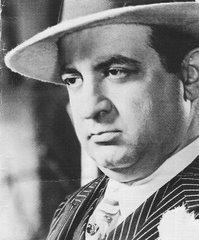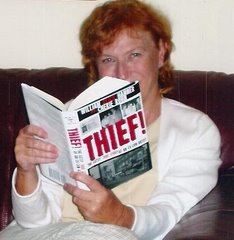In an exclusive Mob Speak interview, Seth Ferranti reflects on his latest and most powerful book to date, The Supreme Team: The Birth of Crack and Hip-hop, Prince's Reign of Terror and the Supreme/50 Cent Beef Exposed.
In the words of author Seth Ferranti, "The Supreme Team has gone down in street legend and the lyrical lore of hip-hop and gangsta rap as one of the most vicious crews to ever emerge on the streets of New York. Their mythical and iconic status inspired hip-hop culture and rap superstars like 50 Cent, Jay-Z, Biggie, Nas and Ja Rule. Born at the same time as crack, hip-hop was heavily influenced by the drug crews that controlled New York's streets. And the cliche of art imitating life and vice versa came full circle in the saga of the Supreme Team's infamous leaders Kenneth "Supreme" McGriff and Gerald "Prince" Miller. In the maelstrom of the mid-80s crack storm and burgeoning hip-hop scene, their influence and relevance left a lasting impression."
We speak now with Seth Ferranti, multi-published author who resides in the Federal Bureau of Prisons. He's lived in "the belly of the beast" as he calls it almost 19 years for a non-violent, first-time offense on a drug conspiracy charge. His current release date is set for 2015.
MS: In the foreword of your book Plex states, “Seth has chosen to investigate, interview and filter the information with an unbiased eye choosing to educate his readers with truth rather than make money off of glorified lies…” Is keeping to the facts and not embellishing difficult for you?
 |
| Kenneth "Supreme" McGriff |
SF:
I have to stick to the facts, I am not writing fiction. I am
writing real life stories and dudes in prison are reading what I am writing and
taking it as the gospel truth so I have to make sure everything is kosher
because if it’s not and I report something wrong dudes could end up getting
stabbed or hurt due to things I put in my book. This is a big responsibility to
me that I don't take lightly. Even more so I have to make sure my facts are
straight so that I don't face the same fate. I am not trying to have to look
over my shoulder all the time. I am in prison with these dudes I am writing
about. How many times do you think a mainstream media journalist wrote
something about someone and they wanted to punch them or shoot them or even
kill them? I am sure it has happened many times. Didn't John Gotti and other
Mafia figures get several journalist or radio personalities beat down for
disparaging marks? Didn't Pablo Escobar kill numerous reporters that told his
tale or left him portrayed in an unflattering light? Haven't multitudes of
journalist in Mexico been killed by the cartels? By keeping to the facts I
protect myself. I believe in the saying the truth will set you free. It isn't
always what you say it is what you don't say. I am not a member of the
mainstream media, I am not a member of law enforcement, I am not a historian, I
am just a man in unusual circumstances trying to tell stories that I want to
tell. Granted I do tend to glorify and romanticize but I am writing from the
other side of the coin, the flip side of the stream. I write from the convict
and criminals point of view. That is my claim to fame, that is who I am. Right
or wrong, that is what I do.
MS: You say that “…many black gangsters have a newfound relevance in our culture because rappers put them on pedestals and mythologized their crime exploits.” Do you perceive part of your role as someone who sorts through the myth and ferrets out the real story?
SF: I sort through the myth and the facts but I put it all in there. To me in every myth or legend there is a kernel of truth. In every legend from Robin Hood to Supreme’s. I write to keep the legend and myth going, to sustain it. I am not here to tear down someone's legacy. I didn't start any of this, we have been interested in and writing about outlaw heroes since the dawn of time, I am just continuing the tradition albeit in a different medium. Like I said I am a storyteller. I am like the poet and the bard who tells the grandiose tales by the fireside. I seek to entertain in my stories. But I put the facts in with the myths. Who am I to tarnish the legacy of one of these men who are heroes to their hometown and community? People need heroes. I am just a collector of stories. I research and gather material on stories that interest me, put them together and then move on to the next one. It just so happens that due to me being in prison I am doing a lot of stuff on black gangsters. But this is just for now. I will move on from this but I will keep doing the same thing. I like the glorification and romanticism of it. I like the Hollywoodization of these stories. I am a propagator of the myths and legends. For whatever reasons I have decided that this is my calling for now. So yes I sort through the myth and the real story but I lay it all out there for the reader to decide. I am not here to make pronouncements or judgments on anyone or anything. I am not trying to get to the bottom of anything. I am just trying to entertain myself and other people with my writing. Because to me what I do is fun and I have a passion for it.
MS: In the book, you chronicle the rise, fall and rise again of the Supreme Team. How did you amass such a large body of material on this allegedly 200-member+ organization then sort out what was “real” for final inclusion.
SF: I talked to a lot of people. I researched this book for almost 7 years. I wrote drafts and sent them to members of the team to review and correct and authenticate. I let dudes in prison from Queens, who grew up when the team was in power read the manuscripts and I took everything, everybody said and put it in the manuscript. Of course as a writer I am looking to check facts. Like if one person told me something I would look for other people to corroborate it. That is how I sorted out what is real. If I heard it from multiple sources then I knew it was true. But I had access to a lot of Supreme Team dudes also that I did time with and even Supreme himself who is the namesake, founder and leader of the team. I got and received approval and his blessing to do this book. I believe this book is the concise volume on the Supreme team to date. I used all the other books like Copshot and Queens Reigns Supreme and all the magazine articles from Don Diva (which I wrote) and F.E.D.S. and AS IS as source material and put it all together in one massive tome. It was a tremendous amount of work and the book ended with over 100,000 words. We also got over 75 photos for it of the team members in all their 1980s glory. These dudes were the Tony Montana's and Scarface's of the black underworld and it just wasn't one individual it was a number of them and they were all larger than life characters. To me at this point in my life this is my masterpiece. I hope others feel the same way. Time will tell. But in truth as I said in the author’s note, I was limited in the amount of members who I could talk to there was no way I was talking to all 200 or so, but I did talk to as many as possible and I stand by my work and know that it is a truly wonderful and fabulous story and look into these men's lives and the beginnings of hip-hop and the crack era and the part they played in shaping all that.
MS:
What were some of the problems/challenges you encountered writing The
Supreme Team?
Do you think some of the Supreme Team members didn’t want you to write the book? Maybe they want to stay under the radar?
SF: I know Bimmy was advertising a DVD in his magazine Cornerstore, with a similar title to mine. But it hasn't came out to date. I know Prince supposedly has a manuscript The Supreme Team: From Legend to Legacy but it hasn't come out either. I know Ronald "Tuck" Tucker has a book, Team Player: Tales from a Southside Ambassador, that is coming out. I read a couple chapters of it several years ago and they were good. I wanted to use some of the events in Tuck’s book in mine but he vetoed that, so I respected it. I am waiting for all these projects to come out and I will support them all. Or any other projects that come out on the Supreme Team. I don't think they want to stay under the radar because if they did why would they be working on all these projects and going online and on YouTube and talking about them. Or doing interviews in the magazines. I mean it was all good when they were out there in the 1980s being gangsters but all of a sudden it’s not good when someone wants to write about it? I don't get it. If a person courted fame, courted infamy and did the things on the streets that led them to being notorious why would they not want someone to write about it later down the line? That is what myths and legends are about. That is what I do. But I didn't start this stuff it has been around since Robin Hood and Billy the Kid. So don't blame me because you don't want your story written. It is public record anyhow and like I said I made the effort to connect with a lot of these dudes so that they could go over what was written and object to it or collaborate with me on the project, some did, some chose not to. I gave them the ultimate consideration and respect by doing this. A big publisher would just ask them if they want to talk to them about the story or make a comment and then roll from there. So to me it is a lot of unnecessary crying on their part. You were a notorious dude in the 1980s, the rappers made you a part of hip-hop's lyrical lore and now there is a cottage industry of street mags like Don Diva and F.E.D.S. and street books like mine that celebrate, glorify and romanticize your story and exploits. So get over it.
***
Part II coming soon.




No comments:
Post a Comment